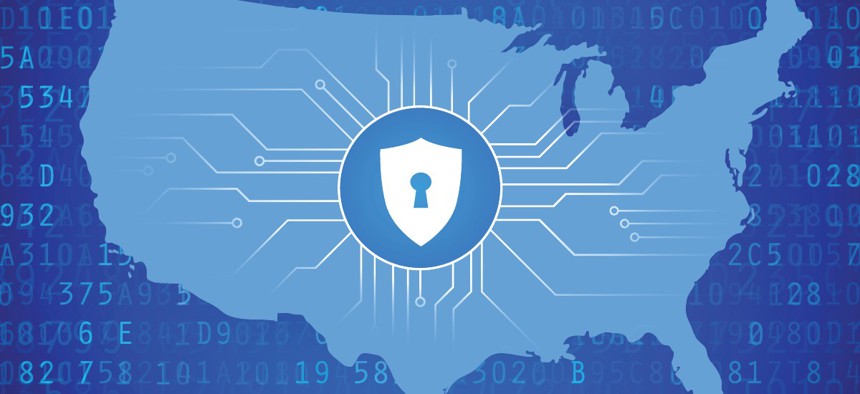Connecting state and local government leaders
A new report from Georgetown University’s Center for Security and Emerging Technology found that at least 1,681 state and local governments purchased equipment from five Chinese companies that were banned by the federal government between 2015 and 2021.
U.S. policymakers have moved to block federal agencies and critical networks from using some foreign-made technologies that pose a threat to national security. But state and local government entities in nearly every state have purchased technologies from banned companies in recent years to support a host of public services, according to a report from Georgetown University’s Center for Security and Emerging Technology released on Wednesday.
The report, which examined public government procurement records provided by GovSpend, found that at least 1,681 state and local entities in 49 states purchased information and communications technology and services, or ICTS, from five banned Chinese companies between 2015 and 2021.
“Collectively, these entities conducted nearly 5,700 transactions involving a wide range of covered equipment, including but not limited to smartphones, surveillance cameras, temperature scanners, handheld radios and networking equipment,” the report said, adding that the acquired technologies have been deployed “in schools, hospitals, prisons, public transit systems and government offices around the country.”
Jack Corrigan, a research analyst at the Center for Security and Emerging Technology who co-authored the report, told Nextgov that the 1,681 state and local entities identified in the report likely represents “a lowball estimate,” since the public procurement records analyzed for the report were not standardized in terms of listed information.
In addition to Corrigan, the report was co-authored by Michael Kratsios—the managing director at Scale AI who previously served as chief technology officer during the Trump administration—and Sergio Fontanez, an associate at the Holland & Knight law firm.
Section 889 of the 2019 National Defense Authorization Act prohibited federal agencies from using technologies or services provided by those five Chinese companies—Huawei, ZTE, Hikvision, Dahua and Hytera—as well as from working with any contractors that use equipment from those firms. As the report noted, Section 889 “is the first and most well-known regulation targeting foreign ICTS on the grounds of national security.”
“If we see untrustworthy foreign technology as a national security issue, then it needs to be handled by every level of government,” Corrigan said.
Although five states—Florida, Georgia, Louisiana, Texas and Vermont—have also “adopted measures to restrict the purchase of untrustworthy ICTS on national security grounds,” the report said that “these regulations are generally not structured to deal with foreign technology threats effectively.” Only one state—Vermont—was found to not have any state or local government entities that purchased banned ICTS covered under Section 889 during the examined time period.
Congress and the federal government have moved in recent years to further prohibit the use of some foreign-made technologies and equipment, particularly those from Chinese and Russian companies. These legislative and regulatory efforts have largely been enacted over concerns that “covered technologies could contain secret backdoors or vulnerabilities that are deliberately baked into the technologies.”
“For U.S. national security leaders, the broad reach of these firms—and their integration into the networks of the United States and its allies—presented major national security and economic threats,” the report said. “If the [Chinese Communist Party] wanted to use the Chinese tech industry as a conduit for espionage and other nefarious activities, it could potentially gain access to all these global networks.”
While efforts to purge foreign ICTS have largely focused on federal services and agencies, the report said that the federal laws and regulatory measures already in place could be broadened to focus more on state and local government procurement processes, since “the U.S. government is in the best position to identify vulnerable ICTS and develop strategies to eliminate them from nationwide supply chains.”
The report noted, for example, that the Commerce Department’s ICTS rule—which restricts the procurement of technology and equipment from untrustworthy foreign companies—”has the potential to significantly strengthen the federal government’s ability to crackdown on foreign technology threats across the broader U.S. market, but only if the Commerce Department implements the authority effectively.”
And the Federal Communications Commission also has the authority to determine what foreign ICTS can be legally sold in the U.S. under the Secure Equipment Act of 2021, allowing the agency to “keep untrustworthy foreign technologies from entering the U.S. market,” according to the report.
“Given their resource constraints and limited mandate, state and local governments should not be expected to independently grapple with the national security implications of foreign ICTS,” the report said. “However, by adhering to federal rules on foreign ICTS procurement, state and local governments can protect their digital infrastructure and keep procurement practices up to date without constant regulatory, administrative or legislative interventions.”
As for state and local entities that are already using foreign-made technologies and equipment deemed a national security risk, the report said that the federal government should continue to support programs that replace “compromised ICTS with more trustworthy alternatives.” These so-called rip and replace programs include the FCC’s Secure and Trusted Communications Networks Reimbursement Program, which covers the cost of removing and replacing equipment from Chinese firms Huawei and ZTE. As Corrigan noted, however, in just the first round of applications for the program, “the requests far exceed the available funds.”
“It's likely impossible to replace every deployment of untrustworthy foreign technology across the U.S., so policymakers should allocate these funds to the areas with the greatest potential security risks,” Corrigan added.

NEXT STORY: Big Apple polishes data operations




